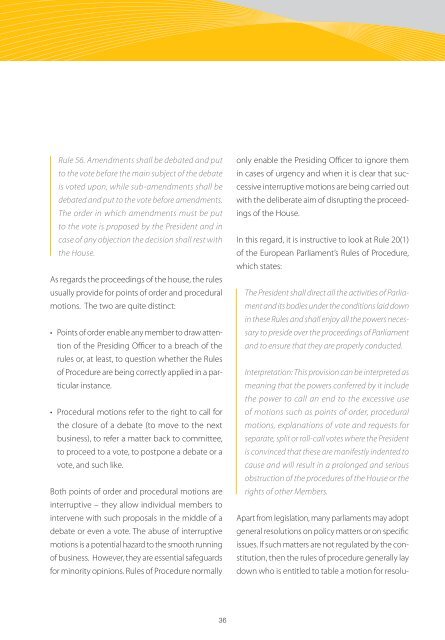Parliamentary Rules of Procedure - European Parliament - Europa
Parliamentary Rules of Procedure - European Parliament - Europa
Parliamentary Rules of Procedure - European Parliament - Europa
Create successful ePaper yourself
Turn your PDF publications into a flip-book with our unique Google optimized e-Paper software.
Rule 56. Amendments shall be debated and put<br />
to the vote before the main subject <strong>of</strong> the debate<br />
is voted upon, while sub-amendments shall be<br />
debated and put to the vote before amendments.<br />
The order in which amendments must be put<br />
to the vote is proposed by the President and in<br />
case <strong>of</strong> any objection the decision shall rest with<br />
the House.<br />
as regards the proceedings <strong>of</strong> the house, the rules<br />
usually provide for points <strong>of</strong> order and procedural<br />
motions. The two are quite distinct:<br />
• Points <strong>of</strong> order enable any member to draw attention<br />
<strong>of</strong> the Presiding Officer to a breach <strong>of</strong> the<br />
rules or, at least, to question whether the <strong>Rules</strong><br />
<strong>of</strong> <strong>Procedure</strong> are being correctly applied in a particular<br />
instance.<br />
• Procedural motions refer to the right to call for<br />
the closure <strong>of</strong> a debate (to move to the next<br />
business), to refer a matter back to committee,<br />
to proceed to a vote, to postpone a debate or a<br />
vote, and such like.<br />
Both points <strong>of</strong> order and procedural motions are<br />
interruptive – they allow individual members to<br />
intervene with such proposals in the middle <strong>of</strong> a<br />
debate or even a vote. The abuse <strong>of</strong> interruptive<br />
motions is a potential hazard to the smooth running<br />
<strong>of</strong> business. However, they are essential safeguards<br />
for minority opinions. <strong>Rules</strong> <strong>of</strong> <strong>Procedure</strong> normally<br />
36<br />
only enable the Presiding Officer to ignore them<br />
in cases <strong>of</strong> urgency and when it is clear that successive<br />
interruptive motions are being carried out<br />
with the deliberate aim <strong>of</strong> disrupting the proceedings<br />
<strong>of</strong> the House.<br />
in this regard, it is instructive to look at Rule 20(1)<br />
<strong>of</strong> the <strong>European</strong> <strong>Parliament</strong>’s <strong>Rules</strong> <strong>of</strong> <strong>Procedure</strong>,<br />
which states:<br />
The President shall direct all the activities <strong>of</strong> <strong>Parliament</strong><br />
and its bodies under the conditions laid down<br />
in these <strong>Rules</strong> and shall enjoy all the powers necessary<br />
to preside over the proceedings <strong>of</strong> <strong>Parliament</strong><br />
and to ensure that they are properly conducted.<br />
Interpretation: This provision can be interpreted as<br />
meaning that the powers conferred by it include<br />
the power to call an end to the excessive use<br />
<strong>of</strong> motions such as points <strong>of</strong> order, procedural<br />
motions, explanations <strong>of</strong> vote and requests for<br />
separate, split or roll-call votes where the President<br />
is convinced that these are manifestly indented to<br />
cause and will result in a prolonged and serious<br />
obstruction <strong>of</strong> the procedures <strong>of</strong> the House or the<br />
rights <strong>of</strong> other Members.<br />
apart from legislation, many parliaments may adopt<br />
general resolutions on policy matters or on specific<br />
issues. if such matters are not regulated by the constitution,<br />
then the rules <strong>of</strong> procedure generally lay<br />
down who is entitled to table a motion for resolu-

















